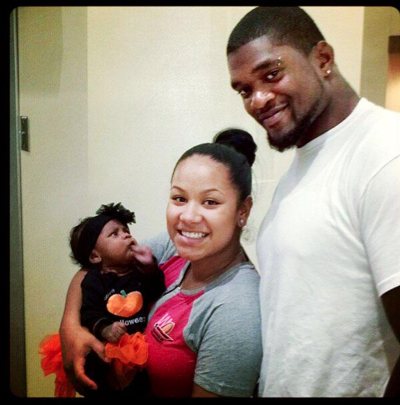
On Saturday, Kansas City Chiefs linebacker Jovan Belcher, 25, shot and killed Kasandra Perkins, 22, his girlfriend, and mother of his 3-month-old daughter before turning the gun on himself. The day before, Kasandra posted pictures to Instagram that told a very different story than the one that would unfold less than 24 hours later; pictures of Belcher, a happy father, kissing his baby girl’s cheek.
As early reports surrounding this tragedy begin to surface, police and friends speculate that the catalyst for the argument that lead to the murder-suicide was Belcher’s anger over Kasandra going to a concert the night before. But as family and friends continue to speak out, it becomes clear that the tragedy was triggered long before the fatal night by a relationship under intense strain. No one has pointed to a relationship full of physical violence, but in the words of Kasandra’s cousin, Angela Perkins, “It wasn’t a healthy thing that was going on.”
Why did this young couple, with seemingly normal “young couple” problems, implode in such a violent, tragic way? The two people that may know the true answer to this question are no longer alive to answer it. One thing that we may know to be true, however, is that this level of violence usually doesn’t emerge out of the blue.
Years ago, I found myself in a violent situation that in retrospect was years in the making. The red flags were there throughout, but I had only been trained to recognize those flags that look like the ones in a Lifetime Movie. I wasn’t getting stalked in the bathroom and beat up just because it was Tuesday. But the toxic relationship was something that was evident long before the violent ending.
It took support, and some therapy, for me to understand some of the signs that were present throughout our relationship, and to emotionally let go of it:
Hitting isn’t the only form of abuse. Threatening violence toward you and family members, threatening to hurt or kill themselves, trying to keep you from friends or family, and verbal and emotional abuse; many of these behaviors are present long before an act of physical violence occurs. Recognize that these controlling behaviors often lead to physical violence and will most often only get worse if left unchecked.
Nice guys (and girls) can be violent and controlling. Due to the images that we see in movies and the media, domestic violence perpetrators are often portrayed like the husband in the burning bed; Sinister, alcoholics or drug addicts, mentally ill, or just all-around mean people. A violent person can be all of these things, or he can be a nice guy who doesn’t know how to control his anger. An individual can be capable of violence whether or not he or she is a “good” person deep down inside.
Go with your gut. Sometimes you may not be able to put all the pieces together and pinpoint why you should walk away. Sometimes it’s just a feeling deep inside you that says “Leave.” Listen to that voice. No love, not even one that’s been joined together by marriage, should be strong enough to make you sacrifice the physical and emotional safety of you and your family.
I know that this may be controversial, but in my own experience, I wasn’t able to get control of my life until I stopped viewing myself as a “victim” and started viewing myself as a participant, which I admit happened long after the relationship was over. It wasn’t until I could recognize those signs and own the fact that I chose to participate in an unhealthy, and eventually violent game, that I could choose a different type of relationship; one built on love, honor and mutual respect.
Follow Aja Jackson at Making Love in the Microwave on Facebook and on Twitter.